Chapter 2 The Future of Japan's Development Cooperation
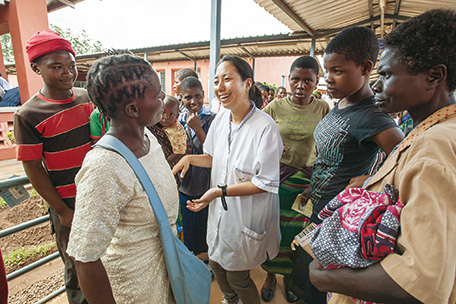
A Japan Overseas Cooperation Volunteer (pharmacist), Ms. Yukiko Kusumi, talking with outpatients in the pharmacy of a hospital in Thyolo District, Malawi. The pharmacy has introduced numbered tickets in an attempt to reduce congestion of outpatients who are waiting to receive their medicine. (Photo: Kenshiro Imamura / JICA)

Community Empowerment Project through Small Business Promotion by One Village One Product (OVOP) Approach in Issyk-Kul region in Kyrgyz Republic. Women inspecting felt products that will be sold by "Mujirushi Ryohin" (Ryohin Keikaku Co., Ltd.) Thorough inspection is conducted to meet MUJI's quality standards. (Photo: Kaku Suzuki / JICA)
As explained in Chapter 1, over the past 60 years, Japan's ODA contributed to the advancement of Japan's peace, stability, and prosperity, while flexibly adapting to the changes in the international environment. This raises the question, how should the future of ODA be? The answer is outlined in the new Development Cooperation Charter (the full text of the new Charter is in Part III).
The new Charter was compiled over a period of roughly one year from March 2014, taking into account the opinions received from the business community, scholars, and NGOs through a multitude of occasions, such as the discussions of an advisory panel, the solicitation of public comments, and open forums and public hearings held throughout Japan. The new Charter was approved by a Cabinet decision in February 2015.
The new Charter begins with an overview of the current situation of the international community.
First, the Charter mentions the ever-expanding list of issues and risks associated with globalization, as was described in the previous chapter. The issues include transnational issues such as environmental issues and climate change, natural disasters, food crisis and hunger, energy issues, and infectious diseases. There are also the threats to the peace and stability of the international community, such as international terrorism, transnational organized crimes, and piracy. In addition, there are humanitarian issues confronting fragile states during conflict and the post-conflict reconstruction stage, as well as regional conflicts and political instability. With increasing interdependence, there is a heightened sense of crisis that these various risks across the world are having adverse effects on the peace and prosperity of the world at large.
Secondly, development issues are increasing in complexity as developing countries diversify and multi-polarize. Per capita income levels alone do not capture the severity of each issue, such as the development challenges of the individual countries and their special vulnerabilities.
Thirdly, there is the rise of emerging countries which have heightened their presence as new providers of development cooperation due to their rapid economic growth. In recent years, vast sums of private flows have entered developing countries, with many of them garnering attention as new investment destinations and markets. According to the statistics of the OECD-DAC and World Bank, private flows amounting to approximately 2.5 times the volume of ODA entered developing countries in 2012. That is to say, the ODA of developed countries alone cannot achieve the development of developing countries. Coordinated implementation with private and other flows is becoming indispensable.
The new Development Cooperation Charter states that based on this recognition, Japan will promote development cooperation in order to contribute more proactively to the peace, stability, and prosperity of the international community. The Charter presents that such cooperation will also lead to ensuring Japan's national interests such as maintaining its peace and security, achieving further prosperity, realizing an international environment that provides stability, transparency, and predictability, and maintaining and protecting an international order based on universal values.
On this basis, the new Development Cooperation Charter identifies that the “basic policies” of Japan's development cooperation constitute the following three philosophies, namely, the fundamental principles that Japan developed throughout the 60-year history of Japan's ODA. The first is “Contributing to peace and prosperity through cooperation for non-military purposes.” Contributing to the peace and prosperity of the international community through non-military development cooperation exemplifies what Japan stands for as a contributor to peace. In order for Japan to contribute even more proactively to the securing of peace, stability, and prosperity of the international community, the new Charter sets forth the basic policy of promoting development cooperation that is commensurate with Japan's role as a peace-loving nation, i.e., “Contributing to peace and prosperity through cooperation for non-military purposes.” Furthermore, the new Charter states clearly that in implementing Japan's development cooperation, Japan will maintain the principle of “avoiding any use of development cooperation for military purposes or for aggravation of international conflicts” and paying adequate attention to “situation regarding consolidation of democratization, the rule of law and the protection of basic human rights.”
The second is “Promoting human security.” As the previous chapter noted, Japan has actively advocated to the international community the concept of human security, which means to free each and every person from fear and want and to develop his or her potential capabilities. The new Charter expresses that Japan will continue to promote development cooperation from the standpoint of its people-centered approach. Particularly important are the initiatives for protecting women's rights and improving their status, as well as for facilitating women's empowerment and participation in society, being mindful of the roles played by women in the development of the country concerned. Also, “promoting women's participation” is raised as one of the implementation principles.
The third is “Cooperation aimed at self-reliant development through assistance for self-help efforts as well as dialogue and collaboration based on Japan's experience and expertise.” As Chapter 1 showed, Japan emerged from the ashes of war to tackle numerous challenges on its own and achieved postwar growth, while receiving assistance from various countries. In light of this experience, Japan has consistently upheld the promotion of self-help efforts and “ownership” of developing countries as Japan's fundamental principle of assistance. The new Charter maintains that development cooperation will prioritize “human resources development,” which involves conveying from person to person Japan's own experience or the experience of developing countries that Japan has supported. In the process of thinking together and moving forward together, Japan will continue to implement cooperation that encourages the autonomy and self-help efforts of developing countries and promotes mutual learning.
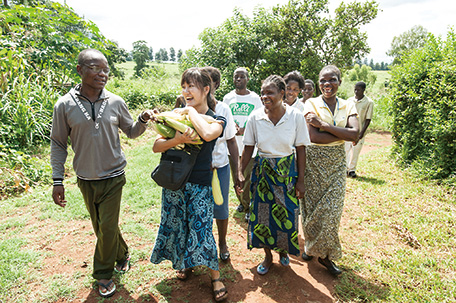
A Japan Overseas Cooperation Volunteer (vegetable growing), Ms. Yui Ogawa, with students of the Mulanje Vocational Training Centre and School for the Blind in Malawi, bringing back harvested sweet corn for lunch. (Photo: Kenshiro Imamura / JICA)
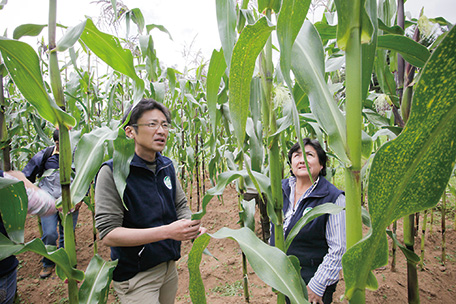
An expert, Mr. Michinori Yoshino, inspecting the growth of purple corn planted by the farmers participating in the Project for Improving Livelihood of Small-scale Farmers in Cajamarca in Peru. Purple corn is the basic ingredient of chicha morada, a common drink in Peru. (Photo: Kosuke Okahara / JICA)
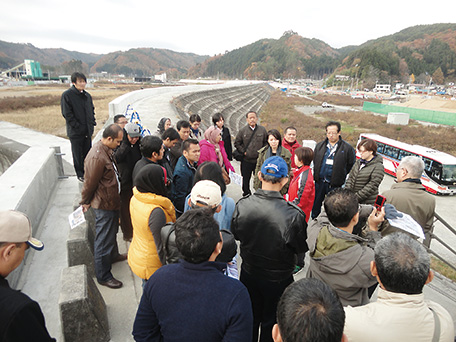
As part of Japanese ODA loans to Indonesia, "Professional Human ResourceDevelopment Project" the Ritsumeikan University has been contracted to conduct training on public policy making and disaster risk reduction, and it has implemented such training on eight occasions since 2009 in Japan for university teachers and administrative officials from across Indonesia. The photograph shows a visit to the seawall in Miyako City, Iwate Prefecture, during the disaster risk reduction training held in November 2014. The tsunami caused by the Great East Japan Earthquake swept over this seawall, which was once called as the "Great Wall of China." (Photo: Ritsumeikan University)
Based on this fundamental concept, the new Charter presents the following three priority issues of Japan's development cooperation from now on.
The first is “‘quality growth' and poverty eradication through such growth.” As explained so far, Japan has consistently extended assistance based on the view that growth is necessary for the sustainable realization of poverty reduction, and therefore, by treating poverty reduction and growth as a unit. This is also the direction towards which Japan has steered international aid trends. Against the backdrop of economic globalization, there are issues which are becoming more pronounced, including the challenges facing the people left behind due to widening intra-country disparities and the “middle income trap” in which growth stagnates following a certain level of economic growth. It is an important issue to support fragile states such as small island countries that have not been able to grasp the opportunities for development for different reasons. Economic growth must help overcome these challenges. This kind of “quality growth” is specified as a priority issue in the new Charter. In short, the new Charter sets out that Japan's development cooperation aims to achieve “quality growth” accompanied by: “inclusiveness” in which no one is left behind and everyone can benefit from the fruits of development; “sustainability” in which sustainable development can be achieved in three dimensions, namely economic, social and environmental; and “resilience” to risks, such as conflicts, disasters, and economic crises, which is built up through individual and community capacity-building and infrastructure development.
The second is “sharing universal values and realizing a peaceful and secure society.” In order to achieve stable development through “quality growth,” it is essential that people engage in their economic and social activities with a sense of safety and that society is managed equitably and stably. Japan proactively provides assistance for strengthening the platform that serves as a prerequisite to this development. Concrete initiatives include assistance for peacebuilding, along with assistance for maintaining stability and security, such as bolstering the coast guard's capabilities and other law enforcement capabilities, and strengthening security maintenance capabilities, including counterterrorism measures and immigration and emigration management. Also, in order to realize a fair and stable society, it is essential to share universal values such as freedom, democracy, respect for fundamental human rights, and the rule of law. Japan will continue to make efforts by supporting capacity development for legal and judicial systems as well as improving governance.
The third is “building a sustainable and resilient international community through efforts to address global challenges.” In today's globalized world, global challenges are mounting, such as environmental issues and climate change, natural disasters, infectious diseases, and food issues. These issues, among others, seriously impact the poor in developing countries and cannot be dealt with by a single country alone. These issues are important themes for discussions on the post-2015 development agenda. The new Charter sets out the Japanese government's commitment to further strengthen the efforts it has led for coping with global challenges, such as environmental issues, health issues, and disaster risk reduction, and strive to resolve these challenges more proactively, including by promoting universal health coverage (UHC) (see this) and promoting the mainstreaming of disaster risk reduction (see ODA Topics).
Further still, the new Charter sets out that the Japanese government will pursue strategic development cooperation based on Japan's foreign policy. The Charter maintains that to this end Japan will execute strategic and effective development cooperation and evaluate its achievements from a diplomatic point of view, while giving full consideration to the situation of the international community, including developing countries, as well as the development policies and plans of the developing countries themselves and the strategic importance to Japan. As stated earlier, private flows that significantly exceed the volume of ODA have begun to flow into developing countries. Under these circumstances, the new Charter states that Japan will further strengthen public-private partnerships, including the comprehensive utilization of Japan's expertise, such as private sector ideas and non-physical aspects, and further enhance coordination with other donors, the civil society, and local governments.
In revising the ODA Charter, its name was modified to “Development Cooperation Charter.” This was above all because Japan and developing countries do not have a vertical relationship in which the former gives unilateral “assistance” to the latter. Rather, ODA is supposed to be mutually beneficial “cooperation” between equal partners. Japan benefits from providing development cooperation, and in turn, supporting the growth of developing countries which are drawing attention as expanding markets, since it also develops markets for Japan. The term “development cooperation” encompasses the meaning of mutually beneficial relationship. It takes into consideration the current international situation outlined in the new Charter, and is also in line with the consistent concept of Japan's ODA, namely, that Japan supports the self-help efforts of developing countries as a partner. This kind of relationship with developing countries fits with the vision of the new Charter, notably, promoting “All-Japan” efforts that include private companies, NGOs, and local governments. In particular, developing countries are eager to attract private investment in addition to ODA for their economic growth. It is becoming indispensable that the government works with the private sector to increase the role of private investment in development, while fulfilling the function of development cooperation as a “catalyst” of private investment that leads to “quality growth” of developing countries. Furthermore, the Charter presents Japan's commitment to provide the necessary cooperation to such countries as small island countries with particular vulnerabilities, even if such cooperation is not classified internationally as ODA according to the simple criteria of per capita income level used in OECD-DAC's ODA statistics as noted earlier.
In this way, based on the newly formulated Development Cooperation Charter, the Japanese government will take more appropriate measures to deal with the new international situation and promote consistent development cooperation typical of Japan. Japan will thereby lead the implementation of the initiatives of the international community and fulfill its role of further ensuring the realization of peace and prosperity of Japan and the rest of the international community.
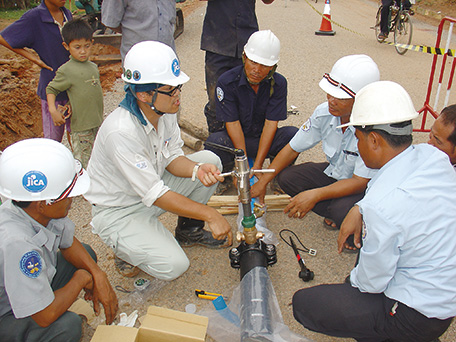
An expert staff from the Kitakyushu City Water and Sewer Bureau, giving technical guidance on laying water pipes in Cambodia. (Photo: JICA)
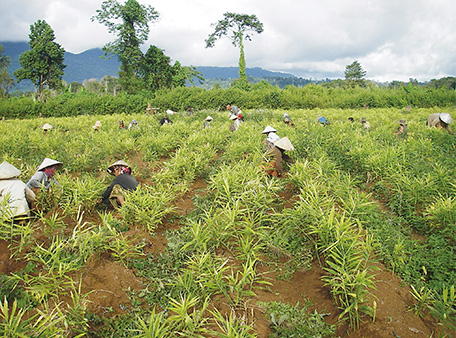
In Laos, ODA, NGO (the Japan Mine Action (JMAS)), and the private sector (Tsumura & Co.) worked together to promote efforts to reduce poverty in rural areas. JMAS conducted detection and clearance of unexploded ordnance (Lao Ngam District), and Tsumura uses the cleared land to cultivate herbal medicine (the photograph shows a ginger field.) (Photo: Tsumura & Co.)
The Development Cooperation Charter sets forth the philosophy and principles of Japan's development cooperation policy. Priority Policy Issues for International Cooperation, Sectoral Development Policy, Country Assistance Policy, and Rolling Plan are established based on this Charter. This section explains this policy framework.
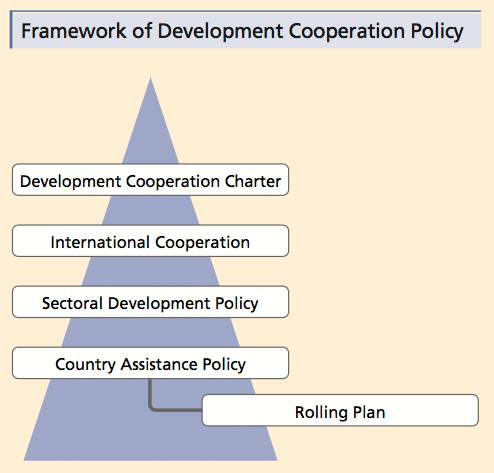
- Priority Policy Issues for International Cooperation
- Priority Policy Issues for International Cooperation are prepared every fiscal year and present Japan's priority policy issues for ODA for that fiscal year. In order to achieve the objectives of ODA – the development and growth of developing countries, for FY2013 Japan decided to utilize ODA in a more strategic and effective manner based on three pillars: (i) ODA to realize a prosperous and stable international community with freedom; (ii) ODA to support emerging/developing economies grow together with Japan; and (iii) ODA to promote human security and strengthen trust in Japan. Specifically, Japan has undertaken the following initiatives: based on the first pillar, ODA supported the efforts towards democratization and national reconciliation of countries around the world, such as Myanmar, and provided assistance to countries that share universal values and strategic interests with Japan; based on the second pillar, ODA contributed to the export of infrastructure systems and to the overseas business development of small and medium enterprises (SMEs) and Japanese local governments; and based on the third pillar, ODA implemented initiatives for promoting human security in poor regions, including Africa, taking into account the Fifth Tokyo International Conference on African Development (TICAD V).
- Sectoral Development Policy
- Japan formulates Sectoral Development Policies in order to effectively implement ODA in specific sectors, including health, education, gender, water and sanitation, environment, and disaster risk reduction, considering the discussions in the international community. Sectoral development policies are reflected in the planning and designing of ODA projects through the formulation of sectoral development initiatives. Formulating a Sectoral Development Policy in addition to the Development Cooperation Charter and Country Assistance Policy further clarifies the guiding principles of Japan's development cooperation and makes its approach easier to understand.
- Country Assistance Policy
- The Country Assistance Policy is Japan's country-specific aid policy that is formulated by comprehensively assessing the development plans and issues of each ODA recipient country, taking its political, economic, and social situations into consideration. The Policy concisely outlines the significance, basic policy, and priorities of the assistance to the recipient country, and thereby, shows a clear vision of the development cooperation implemented through “selection and concentration.” As a general rule, the Policy is formulated for all ODA recipient countries. Policies for 106 countries have been formulated as of October 2014.
- Rolling Plan
- As a rule, the Rolling Plan is an annex document to the Country Assistance Policy for each recipient country of Japan's ODA. The Rolling Plan classifies and lists basically all ongoing ODA projects implemented over several years in the country, according to priority area, development issue, and program in relation to the development cooperation at each stage from its approval to completion stages. The Rolling Plan is aimed at designing, planning, and implementing ODA efficiently and effectively by adopting different development cooperation schemes in an integrated manner, and improving the predictability of how assistance will be carried out over a period of several years.
